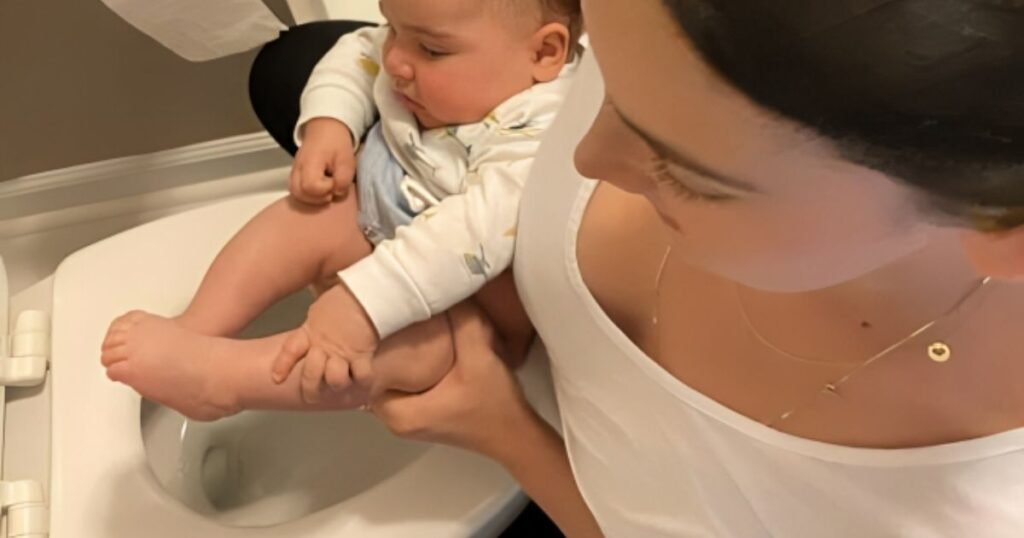
Elimination Communication
What is Elimination Communication (EC)?
Elimination communication is a practice in which a caregiver watches for an infant to signal the need to pee or poop and holds the baby over a waste receptacle. It may also be called infant potty training or infant hygiene.
While the term itself is fairly modern, the practice of responding to an infant’s elimination cues has actually been used for centuries in cultures across Asia, Africa, and South America. In many of these communities, EC is still a normal part of infant care, and it has been, even long before diapers became mainstream.
Ingrid Bauer coined the term “elimination communication” back in 2001; however, the idea was not a new one and comes from ancient civilizations throughout the world. EC was common practice before the 1950s, when diapers were invented. When diapers first hit the market, they weren’t really that popular. Parents just didn’t understand: why would they want to leave their baby to sit in their own waste for any period of time? So, diapers were commonly seen as wasteful.
In 1962, pediatric developmental specialist Dr. T. Berry Brazelton published a paper arguing that parents should not push their children to use the toilet before they were ready.
(Side note: it’s quite interesting to note that Dr. Brazelton was a consultant for Pampers and had made appearances on Pampers commercials.)
Today, it is estimated that 95% of families use disposable diapers—yeah, that’s a lot of diapers! Disposable diapers are estimated to be the third-largest single consumer item in landfills today, and knowing that fact makes it incredibly clear why, today, they are a billion-dollar business.
The fact of the matter is that children are staying in diapers for longer and longer, and unfortunately, that means the landfills are only getting fuller and fuller. Not only do diapers take up physical space, but they are also packed with chemicals that have been linked to cancer and other diseases.

My experience with Elimination Communication
While diapers do offer an undeniable level of convenience, I chose to practice elimination communication with my son starting at five months old. For me personally, the benefits were well worth the initial effort it took to begin EC.
If you’re reading this and thinking, “Alright, this actually sounds interesting, I might give it a go”, then I want you to know that EC isn’t about forcing infants into early toilet training. Instead, it focuses on communication. By using elimination communication, we’re offering baby an opportunity to go, rather than expecting them to hold it or meet specific milestones.
When should you start EC?
Why did I wait until 5 months to begin Elimination Communication?
I will be completely honest with you. When I first read about it, I thought it was wild and that there was no way it would work. I was a firm believer that infants can’t control or sense when they need to eliminate waste. I was also somewhat concerned that training too early could be detrimental if I made using the toilet a source of stress, or if my son felt like he had to “hold it” until someone could help him to the toilet. It was a bit of a head-scratching moment at first, but I started to do some digging online about EC.
After researching some of the history, I did find some very strict and rigid early potty training protocols that were detrimental. However, EC is nothing like these practices, although it is often (unfortunately) lumped in with the term “infant potty training.”
During all this research, I began realizing that when you start EC is totally up to you and your situation. Some families begin at birth, others start months later, and many actually manage to practice part-time, focusing on mornings or at-home routines. The bottom line here is that there’s no one-size-fits-all approach, which makes EC accessible and adaptable to different lifestyles (and I do think that’s a bonus)!
Anyway, the only thing I had left to do was to try out elimination communication. So, one day, I decided to hold my son over the toilet and make the recommended “shhh” sound and see what happens. Guess what…? He peed. Then I tried it again, with my husband this time, just to make absolutely sure it wasn’t a fluke. And it happened again! Needless to say, I was really impressed.
After that eye-opener, I purchased Andrea Olson’s book, Go Diaper Free for 0-18 months. From then, it took us about a week and a few observation times, and we were off to the races and on track with EC!
I practice part-time EC with my son, which means that during the day, we catch poops and most pees. As a backup, we do use cloth diapers. When we are out and about with the family, we often just use diapers and do not practice EC.
While my son will hold his waste for short periods of time, he doesn’t hold it past the point of comfort. He will wiggle around and signal a few times, and if I don’t take him to the potty, he simply goes in his diaper. This was especially important to me because it ensured that I wasn’t causing him any discomfort if he felt the need to wait to use the toilet.
Currently, I use disposable diapers at night. I have experimented with using cloth diapers at night, but that didn’t go too smoothly since I had too many leaks and middle-of-the-night outfit changes.
I tried EC at night a few times, but it woke my son up too much, which ended up with him being more than ready to play and not wanting to go back to sleep! For us, using disposables at night allows us to get more sleep and remain leak-free.

Pros of EC
- Reduces waste
- Saves money by using fewer diapers
- Your child becomes used to using the toilet earlier
- Facilitates the connection between the caregiver and the child
- Decreases irritation or rashes from wet/soiled diapers
- Infants gain confidence as you respond to their needs
Beyond practical benefits, EC often deepens the parent-child bond. As caregivers tune in more closely to their baby’s nonverbal signals, they build mutual trust, which creates moments of attunement that support early emotional development.
Cons of EC
As with any list of “pros” or benefits, there always have to be cons… Well, EC does have downsides, but the good news is that these are very few:
- Time: In the beginning, as you start to learn your baby’s cues, EC can be very time-consuming
- Convenience/Logistics: When you’re going out, it’s often more convenient to just have your baby go in his or her diaper and then change it whenever it’s convenient for you as parents or caregivers
- Isolation: It can be a bit difficult to practice EC consistently if no one else in your social circle practices it
Whether used occasionally or as part of a daily rhythm, EC is ultimately about connection and choice. It’s all about offering babies the option to eliminate in a way that honors their cues and comfort.
For those of you who’d like to know more about cloth diapers vs disposable ones, here’s additional reading material you might find useful from WebMD:

Meet Kaitlyn Foster, RN, PNP
Passionate Doula and Dedicated Healthcare Professional
Kaitlyn Foster is not only the visionary founder of Queen City Doulas but also a proud mother of two energetic boys. With a rich background as a Radical Birth Keeper, she brings a profound dedication to empowering and supporting families through the transformative journey of childbirth.
Kaitlyn’s expertise is further enhanced by her extensive healthcare experience; she is both a registered nurse and a pediatric nurse practitioner. Her unique blend of medical knowledge and passionate advocacy for natural birth experiences makes her a trusted ally to parents navigating the early stages of parenthood in the Charlotte area.

download your free guide
newborn sleep & feeding essentials: a new parent's survival guide
Worried about sleepless nights and feeding your baby? Grab your free copy of our Newborn Sleep & Feeding Survival Guide and start mastering the challenges of new parenthood today!





